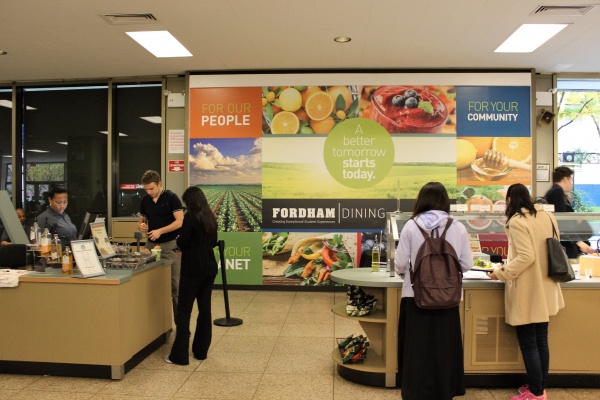Student Starts Petition Against Sodexo
December 11, 2015
On the night of Dec. 3, Jeremy Roberts, Fordham College at Rose Hill (FCRH) ’19, started a Change.org petition called “Make Fordham University Sodexo-Free” with the intent of having Fordham drop Sodexo as its dining service provider.
By 3 p.m. the next day, the petition had 501 signatures, and a formal email had been sent from the Senior Vice President for Student Affairs regarding efforts by the University to improve dining services.
“I’m really happy and very impressed with how active students are, with how willing they are to express their feelings and wanting a change,” Roberts said.
Roberts started the petition “mainly just because the food here is pretty bad,” Roberts said. “We go into [The Marketplace], and we usually walk around and end up getting a bagel and a bowl of cereal, just because none of the food is really appetizing.”
In an email interview, John Azzopardi, Sodexo’s Resident District Manager for On-Site Service Solutions at Fordham University, refuted the claims that Roberts states in his petition.
“Sodexo is aware of [the] petition focused on Sodexo at Fordham and I can tell you that many of the things listed in it are not factually accurate,” Azzopardi said in the email interview.
“A lot of people started talking about it,” Roberts said. “The night when I was making the petition, I was talking to a group of friends who were all complaining about the food, complaining about the quality, so we decided to do something about it. And clearly the sentiment is there. I didn’t really publicize it or anything, I just posted it on a few Facebook pages and now it’s up to 500 signatures.”
This shared sentiment has been shown in the comments on the petition, with several students voicing their complaints, with some even claiming to have gotten “food poisoning” from the food served at Sodexo venues.
At 10:13 a.m. on Dec. 4, the Senior Vice President of Student Affairs sent out an email to the Fordham community, announcing that “the University is initiating the process to ensure continued and progressive improvements in dining services in the medium and long term.”
“Fordham University today issued a Request for Proposals (RFP) to provide dining services to all venues and campuses of the University,” the email said. “The current provider, Sodexo, will continue to provide dining services across the University at least through June 30, 2016, and has been invited to participate in the process.”
The email also said that “while Sodexo continues to advance important improvements in critical areas, Fordham is seeking a longer-term commitment to its service objectives,” and that the process will likely take the remainder of the academic year, but “the University will issue updates on the process as we have new information to offer.”
“I’m very impressed with Fordham’s responsiveness,” Roberts said regarding the email. “I’m impressed with what they’re doing so far with actually taking a step to address student concerns. We’ll see what solution they come to when the time comes, but I’m happy with what the administration is doing so far.”
The petition states, “let’s get Sodexo’s high-cost and low-quality food out. Nutrition is a critical component of student health, and it is Fordham’s responsibility to provide for it.” He then proceeds to describe and cite instances of Sodexo “providing low-quality food for higher prices than non-outsourced options,” such as the company “serving chicken contaminated with Listeria, leading to a cancellation of a 1.2 billion dollar contract with the United States Marine Corps.” In 2007, Sodexo recalled 3,000 pounds of chicken that may have been contaminated with Listeria, according CMD.
He ends the petition claiming that “it is unacceptable for a college with such high room and board costs to provide such low-quality and unhealthy food,” and that “removing Sodexo is a Win-Win solution.”
Sodexo refuted many of these claims.
In the petition, Roberts brings attention to a 2005 class-action lawsuit against Sodexo, “alleging segregation against thousands of black employees,” that the company settled for $80 million. Azzopardi claimed that the lawsuit was “a catalyst for significant, positive change within the organization.”
“While this was a difficult period for Sodexo, Sodexo has become a stronger, sharper and better organization,” Azzopardi said in an email interview. “Sodexo is consistently recognized among all companies in North America as a best place to work for minorities, multicultural women, veterans and people with disabilities. We are a benchmark company for diversity and inclusion.” As recognition of this diversity, “Sodexo is currently ranked #5 on DiversityInc’s Top 50 Companies for Diversity list,” Azzopardi said.
Regarding the termination of the U.S. Marine Corps contract that Roberts mentions in the petition, Azzopardi said “Sodexo is a proud partner of the U.S. Marine Corps. We continue to operate mess hall contracts on both the East and West Coasts and have done so since the beginning of our contract in 2003.”
Sodexo, however, did temporarily lose part of its contract with the U.S. Marine Corps in 2011, following accusations of anti-union practices and poor working conditions, according to Reuters.
In response to the claims of Listeria, Azzopardi said in an email interview that “Sodexo has never had an issue with Listeria at any of the mess halls it operates at U.S. Marine Corps facilities. In fact, as the leading provider of food and facilities management services in North America, Sodexo is committed to providing high quality and safe food service.” In addition to the CMD’s report of contaminated chicken, however, there have been cases of Listeria at other locations where Sodexo has provided dining services, such as Mount Sinai Hospital.
To refute Roberts’s claims of poor food safety and quality, Azzopardi said in an email interview that “in 2014, the International Association for Food Protection (IAFP) selected Sodexo as that year’s recipient of the prestigious Black Pearl Award. The award recognizes a company for its outstanding commitment to, and achievement in, corporate excellence in food safety and quality.”
Regarding Roberts’s horse meat in the UK claim, which did happen, Azzopardi stated in the email interview that a similar situation could not transpire in the United States.
“Sodexo operations in the U.S. do not source beef products from Europe; moreover, all of our raw and frozen ground beef products are sourced domestically,” Azzopardi said. “Further, rigorous United States Department of Agriculture (USDA) guidelines and inspection procedures do not allow for horse meat to be imported or processed for human consumption, and the USDA is on record calling potential impact of the horse meat issue on the U.S. marketplace ‘remote.’ Additionally, Sodexo has requested and received confirmation from our meat suppliers in the U.S. that they do not distribute meat products from European countries.”
Although getting better food is the focus of his petition, Roberts also believes that improvements can be made in the University’s dining services to utilize more local resources.
“The changes I would definitely like to see are healthier food, but especially using local resources,” Roberts said. “I suggested Simon’s Deli could have a restaurant on campus. I don’t know how economically feasible that would be, but a school in California has switched to getting most of their food from local farms, and it’s only a negligible increase in cost because it saves a lot of the transportation costs.”
This program in California that Roberts refers to is the California Farm to School Network, which utilizes local farms to supply food for schools’ dining services.
“There would be better health of the food, and it would be better for the environment and for the local community,” Roberts said. “So I really think using something like that, using the resources we have here.”
“I don’t know if we can use an exact copy of that,” Roberts continued, “but it’s a good kind of idea to have. And especially to help the Bronx because there’s a lot of resources in the Bronx that could be used instead. The biggest thing is that profits aren’t going to the local area, and they really should be, instead of to a big multinational company in the private food service sector.”












